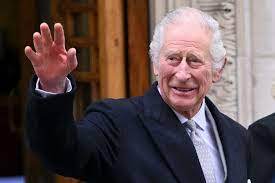
King Charles III has been diagnosed with cancer following a recent procedure for benign prostate enlargement, as announced by Buckingham Palace on Monday. However, the palace did not disclose the specific type of cancer or the severity of the condition.
The statement released by the palace mentioned, “During The King’s recent hospital procedure for benign prostate enlargement, a separate issue of concern was noted. Subsequent diagnostic tests have identified a form of cancer.” Despite this revelation, the nature of the detected cancer remains unclear, with assurance from the palace that it is not prostate cancer.
Enlarged prostate, a condition unrelated to cancer, is relatively common among older men, affecting around 80% of men over the age of 70, according to Yale Medicine. King Charles III, who turned 75 in November, underwent a procedure to address the symptoms associated with this condition, such as difficulty urinating, loss of bladder control, or nocturnal urination.
Dr. William Oh, the chief medical officer of the Prostate Cancer Foundation, explained that a common intervention for benign prostate enlargement is a transurethral resection. This procedure involves the removal of excess prostate tissue to alleviate urinary issues. A scope, equipped with a camera, is inserted through the urethra to guide the removal process.
Dr. Christian Pavlovich, a professor of urology and oncology at Johns Hopkins School of Medicine, highlighted that the scope used in the procedure could also identify cancer in adjacent areas, such as the bladder or urethra. Detection of abnormalities like bloody urine may indicate potential issues like kidney cancer or cancer in the ureter.
Dr. Justin Friedlander, a professor of urologic oncology at Fox Chase Cancer Center, noted that in some cases, cancerous tissue discovered during prostate surgery may originate from other parts of the body, signaling potential advancement of the cancer.
While Dr. Julio Pow-Sang, the chair of the genitourinary oncology program at Moffitt Cancer Center in Tampa, Florida, emphasized that finding cancerous tissue during prostate enlargement procedures is generally rare, there is still a possibility of unexpected outcomes.
Buckingham Palace did not provide details about the specific procedure undergone by King Charles III for his enlarged prostate, referring to it as “corrective.” The palace stated that Charles has commenced regular outpatient treatments for cancer in London.